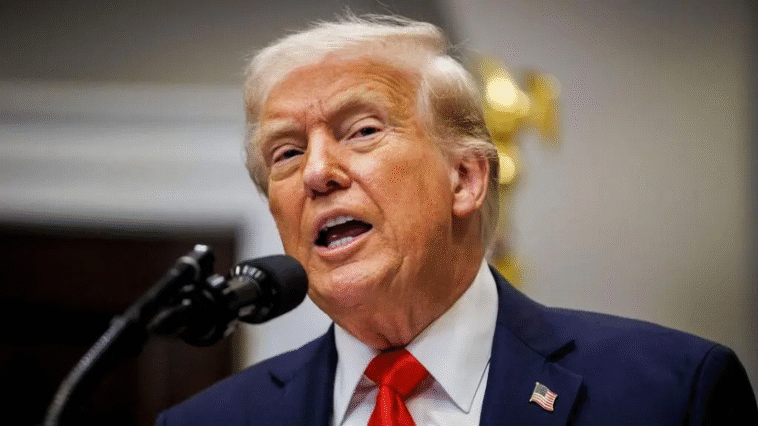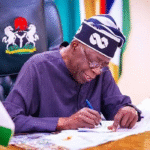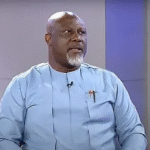Following the expiration of the August 1, tariffs deadline by United States’ President, Donald Trump yesterday, Saturday Telegraph has authoritatively gathered that South Africa is the only country in Africa that negotiated with the U.S. Embassy and U.S. officials at the White House as Nigeria was conspicuously missing in the trade negotiations following the hardline tactics employed by the U.S.
Trump signed an executive order that imposed new tariffs on dozens of countries, which will go into effect in seven days, a deadline that has been delayed by a week so that the tariff schedule could be updated.
Trump said the tax increases on nearly $3 trillion worth of imported goods would bring new wealth, create new factory jobs, reduce budget deficits, and get other countries to treat the U.S. with more respect.
Sadly, the take-off of the U.S. tariffs next week globally is expected to affect about 18,000 manufacturing products from African countries being exported to the U.S. market.
With this, Nigeria is expected to get a 14 per cent tariff directly. Another 10 per cent extra tariff is expected to be imposed on her for being part of a broader group of BRICS partner states, following the January 17, 2025, announcement of Nigeria as a ninth official BRICS partner, joining Belarus, Bolivia, Cuba, Kazakhstan, Malaysia, Thailand, Uganda, and Uzbekistan.
Specifically, a senior official in Trump’s administration said most countries would pay a 10 percent tariff when the policy takes effect next week while other nations that breached the U.S. trade deficits would be hit by at least a 15 per cent rate.
Consequently, members of the country’s Organised Private Sector (OPS) have expressed their thoughts over President Bola Tinubu’s inability to broker a trade deal with the U.S. government on the reciprocal tariff, which will affect Nigeria’s goods, products meant for the U.S. market, and the economy in general.
The private sector group, comprising business membership organisations explained that there is need for President Tinubu to take urgent advantage of the seven days lifeline window by Trump to negotiate the imposition 14 per cent tariff and additional 10 per cent for aligning with BRIC to salvage U.S. – Nigeria bilateral trade relationship, as U.S. still remains the country’s second largest trading partner, after China.
While speaking on how the U.S. tariff announcement will hit countries in Africa, amid unsuccessful negotiations between any specific African nations and Washington in an interview with Saturday Telegraph, a former Chairman of Lagos former Chairman of Lagos Chamber of Commerce and Industry (LCCI) Small and Medium scales Enterprise Group (SMEG), Mr Jon Tudy Kachikwu, said: “There has been high level intensive trade negotiation with the U.S. to find a trade deal by the African leaders, but the U.S. did not strike a deal with any African countries before that August 1 deadline.
And it has become certain that none of these economies are big enough compared to America’s largest trading partners like China, EU; and some say that it shows how low the White House places the African countries on trade.
Kachikwu added: “For instance, South Africa was actively speaking to U.S. officials into the deadline, trying to get feedback on the 30 per cent tariff slammed on them and a proposal given to them about the framework of the trade deal.
“This is really important for South Africa because the U.S. is their second-largest trading partner as they have half a million jobs tied to trading with the U.S., and they were still not able to get across the line.
“South African Trade Minister, as of Wednesday, just hours before the deadline came into place, was on the phone with the U.S. Embassy and a U.S. representative.
“So, SA tariff will be at 30 per cent, likewise Algeria and Libya, while some African countries where the U.S. has a trade deficit will get 14 per cent just like Nigeria, Angola and others.
“But African countries have a lot of products about 18,000 to export to the U.S. So they need to work out some kind of deal before the tariff comes into effect.”
However, the tariff hikes do not come as a surprise, as Trump initially announced them in April.
The American President had set a minimum 10 per cent tariff on every country in the world and additional levies on dozens deemed the worst offenders, citing deficits and unfair trade practices with the U.S.
He delayed the deadline of the tariff implementation, dubbed “Liberation Day,” several times, giving trading partners the opportunity to negotiate.
Some of them were able to negotiate an agreement and even reached tariff-reducing deals.
A 15 percent tariff rate for the EU, for example, was decided on after European Commission President Ursula von der Leyen reached a political agreement with Trump recently.
Some countries, however, were unable to negotiate, filling them with a new dose of uncertainty.
And for some, higher tariffs were put in place than initially promised.
Brazil, with 50 per cent tariffs on its imported goods, and Canada with 35 per cent, are among the hardest hit 39 per cent for Switzerland, 25 per cent for India, and 20 per cent for Taiwan.
Trump issued a separate order for Canada, stating a tariff rise from 25 per cent to 35 per cent, citing the cross-border flow of fentanyl.
The announcement from the White House late Thursday noted that Canada had failed to “do more to arrest, seize, detain or otherwise intercept … traffickers, criminals at large, and illicit drugs.”
Earlier on Thursday, the US President had also said Canada’s announcement that it would recognise Palestine as a state as the reason it would be “very hard” for the U.S. to reach a trade agreement with its northern neighbour.
Similarly, for Brazil, Trump’s tariff decision seemed more about political revenge, as the Republican President directly linked the 50% rate to the trial against former Brazilian President Jair Bolsonaro, which Trump called a “witch hunt.”
The curveballs sharply contrast with Trump’s decision on Mexico, to whom he granted a 90-day extension to continue trade negotiations.





